IELTS TUTOR cung cấp Why Do Singers Lose their Voices: Đề thi thật IELTS READING (IELTS Reading Recent Actual Test) - Làm bài online format computer-based, , kèm đáp án, dịch & giải thích từ vựng - cấu trúc ngữ pháp khó & GIẢI ĐÁP ÁN VỚI LOCATION
I. Kiến thức liên quan
II. Làm bài online (kéo xuống cuối bài blog để xem giải thích từ vựng & cấu trúc cụ thể hơn)
📩 MN AI CHƯA CÓ ĐÁP ÁN FORECAST QUÝ MỚI PART 1-2-3 NHẮN ZL 0905834420 IELTS TUTOR GỬI FREE HẾT NHA
III. Why Do Singers Lose their Voices: Đề thi thật IELTS READING (IELTS Reading Recent Actual Test)
Reading Passage 2
Why Do Singers Lose their Voices
A:
Singing is a tough business. Every vocal performance involves hundreds of thousands of micro-collisions of a thin pair of muscular strips called the vocal cords, located in the larynx in the throat. When we are breathing in, they remain apart; when we sing or speak, air is pushed up out of the lungs, and the edges of the cords come together in a rapid chopping motion. The air causes the cords to vibrate, creating sound. The greater the vibration, the higher the pitch, and when a soprano hits the highest notes, her vocal cords are vibrating 1,000 times per second. This transforms a burst of air from her lungs into a sound powerful enough to shatter glass.
B:
Beautiful singing requires flexible cords, but the friction caused by prolonged overuse can erode their fine, spongy surface and lead to tiny bruises. Eventually, nodules, polyps, or cysts form on the vocal folds, distorting the sound they create. For a singer, the first sign of trouble is often the ‘wobble’: the voice fluctuates on and off key because the damaged cords have lost the ability to resonate properly. Often, there is a ‘hole’, a point on the musical scale where a singer’s vibrating vocal cords fail to produce the proper tone. The sound produced will be flat, or worse still, barely audible.
C:
It was once unheard of for a singer to perform with a faulty voice. However, in recent times, it has become more common for performances to be interrupted, or even cancelled due to the inability of the performer to continue. Some opera singers complain of year-round cold symptoms, and steroid injections and numerous other drugs are often used to get a struggling singer through a performance. But continuing to sing can cause more damage and create voice-ruining scars, similar to when a football player continues to play with a damaged knee and eventually needs surgery. There is no precise data on the number of performers who have undergone surgical procedures, but it is estimated that thousands have been under the knife. Dusty theatres, stuffy airplane cabins, erratic eating and sleeping patterns, and stress all affect the vocal cords. Add to all this the occupational hazard—at least in opera and classical music—of taking on roles that require artists to sing beyond their natural range, and a singer’s cords become extremely susceptible to injury.
D:
Will Crutchfield, a conductor and vocal coach, laments the fact that this vocal burnout is cutting short careers and diminishing the power of opera, and he feels that audiences have become accustomed to hearing voices which are not in peak condition. When he first highlighted the problem, he noticed that it didn’t affect singers until they were in their 30s, but now even singers in their 20s are undergoing medical procedures to save their careers. These injuries have been linked to a shift in what we consider quality singing. Across all genres, it has become normal to believe that louder is better, and singers are pushing their vocal cords like never before. New waves of medical research into dysphonia, or the inability to properly produce sound, bear this out. In the western world, vocal abuse is surprisingly common in all professions that rely on the voice, from schoolteachers to opera singers.>> tham khảo CẦN VIẾT & THU ÂM BAO NHIÊU BÀI ĐỂ ĐẠT 8.0 SPEAKING & 7.0 WRITING?
E:
Steven Zeitels, a specialist vocal cord surgeon, believes that pioneering surgery is the way forward. He is working on a futuristic solution which will involve implanting a gel made of biomaterial in the tissue of damaged vocal cords to restore pliability, and therefore the voice. However, some research studies argue that surgery is not necessarily a lasting fix. According to Lisa Paglin, a singer turned voice coach, Zeitels has simply found a temporary remedy. ‘Unless a singer makes major changes, “return to performing” means a return to the vocal abuse that put him/her on the operating table in the first place.’ Her coaching partner Marianna Brilla agrees. ‘You cannot solve the problem by simply relieving the symptom.’ One observation Paglin and Brilla have made from working with older, classically trained singers is the way that they use the natural up-down release of the diaphragm to produce sound, rather than relying on their vocal cords. For Brilla, this represents a real discovery: the root of the problem today is in classrooms. She believes that students are graduating from music academies without having learned this natural singing method. In her opinion, today’s students ‘don’t know how to sing, and it’s leading to injury’.
F:
Is it possible that teaching people to sing differently could cure damaged vocal cords forever? Zeitels is dismissive of such an approach, and quick to deny that his clients’ vocal problems are caused by bad technique. ‘People used to think if you needed an operation it meant you don’t know how to sing. The people I see—they know how to sing!’ Zeitels believes that medical specialists are becoming increasingly important to the arts, given that any athletic endeavour will eventually take a toll if done for long enough. Robert Sataloff, who has performed voice-corrective surgery on several award-winning performers, also resents the notion that surgery is not a sensible way to keep singers healthy. He believes that surgery, combined with proper education on the dangers of improper singing technique, can keep people on stage for longer. He concedes that surgery is not a perfect solution, and it probably never will be, but it is an option.
Questions 14 – 19
Reading Passage 2 has six sections, A-F.
Which section contains the following information?
Write the correct letter, A-F, in boxes 14-19 on your answer sheet.
Examples of some of the environmental factors which affect singers
A reference to a lack of awareness of a correct singing technique
Details of the physical processes involved when a person sings
A defence of the use of surgery to treat vocal injuries
A description of the initial indications of vocal problems
A reference to modern perceptions of a good singing performance
Questions 20 – 24
Complete the sentences below.
Choose ONE WORD ONLY from the passage for each answer.
Write your answers in boxes 20-24 on your answer sheet.
The …………… of a sound is determined by the rate of vibration of the vocal cords.
The delicate surface of the vocal cords can be worn down by …………… if they are continually overused.
Singers with vocal cord damage are often unable to produce a sound with the correct …………… at a certain point on the musical scale.
Opera singers are often given a variety of …………… to make sure they can complete their performances.
Opera and classical performers are at greater risk of injury if they perform …………… which place exceptional demands on their voices.
Questions 25 – 29
Look at the following statements and the list of people below.
Match each statement with the correct person, A, B, C, or D.
Write the correct letter, A, B, C, or D, in boxes 25-29 on your answer sheet.
NB You may use any letter more than once.
Surgery provides performers with only a short-term solution to their problems.
The public are now used to attending performances given by singers with vocal injuries.
People are wrong to suggest that performers who undergo surgical procedures to repair their voices lack singing ability.
Surgery works best when used in conjunction with re-training performers.
New and innovative surgical techniques hold the key to repairing damaged vocal cords.
List of People
A. Will Crutchfield
B. Steven Zeitels
C. Lisa Paglin
D. Robert Sataloff
IV. Dịch bài đọc Why Do Singers Lose their Voices
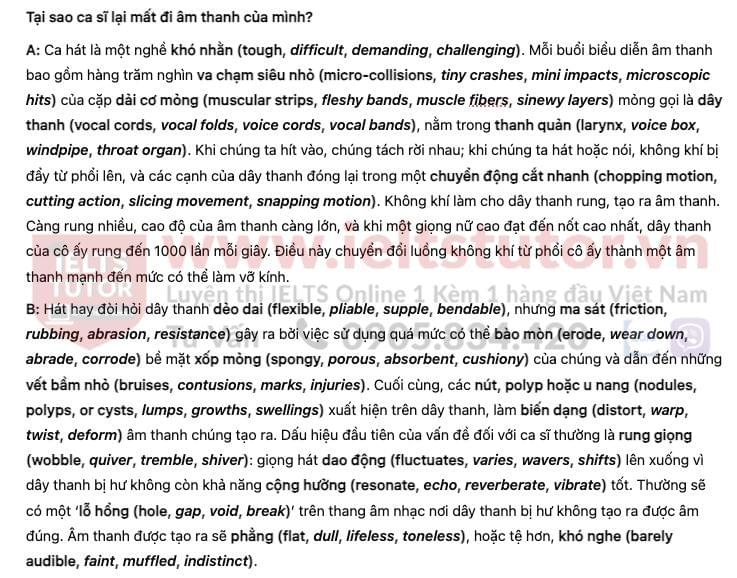
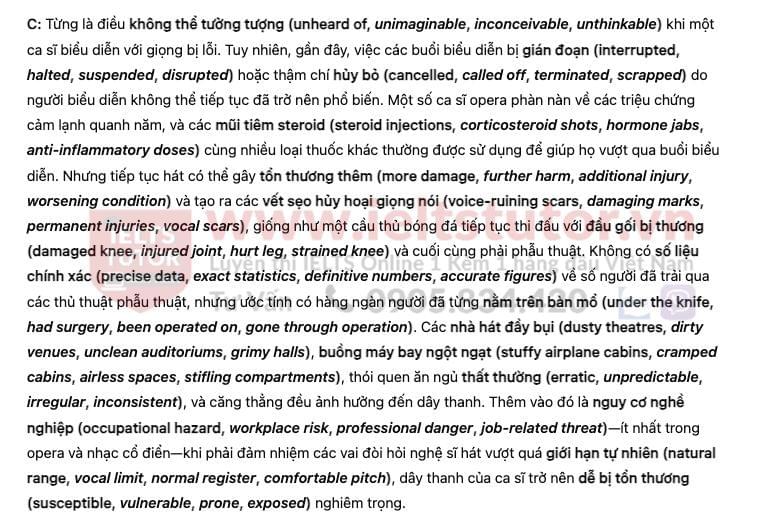
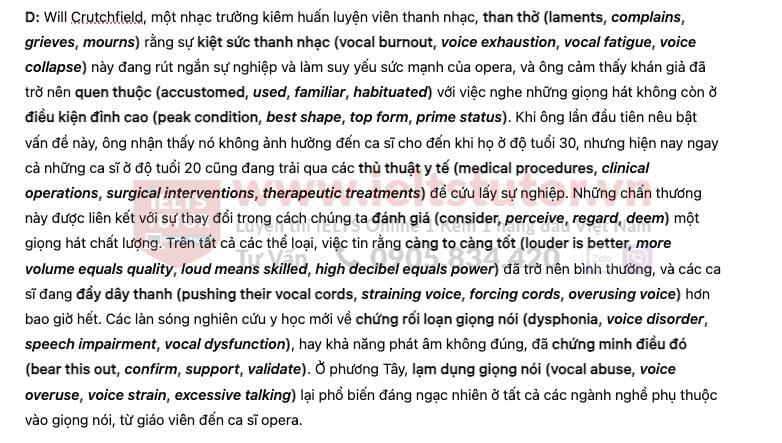
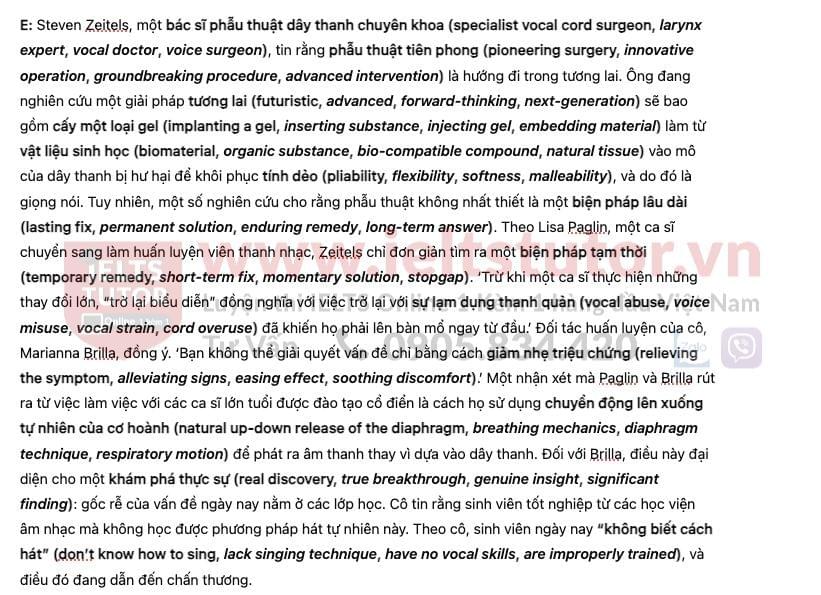
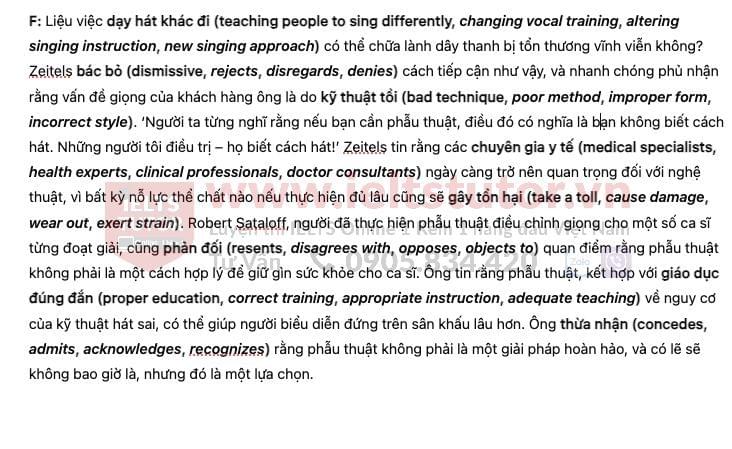
V. Giải thích từ vựng Why Do Singers Lose their Voices

VI. Giải thích cấu trúc ngữ pháp khó Why Do Singers Lose their Voices
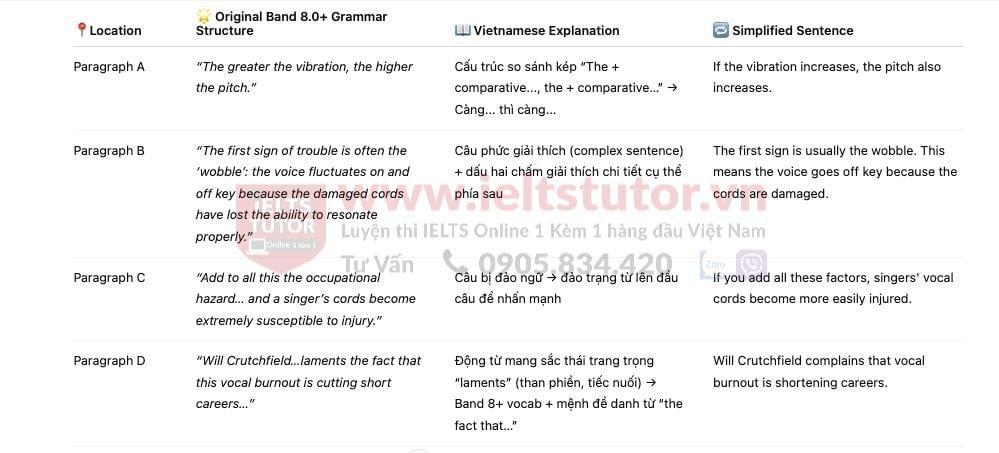

VII. Đáp án Why Do Singers Lose their Voices
Questions 14 – 19
C
E
A
F
B
D
Questions 20 – 24
pitch
friction
tone
drugs
roles
Questions 25 – 29
C
A
B
D
B
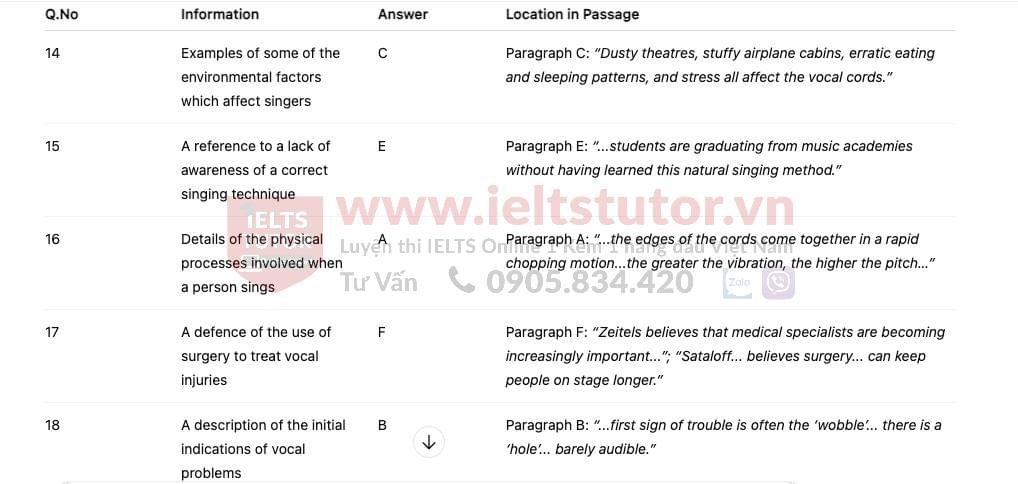
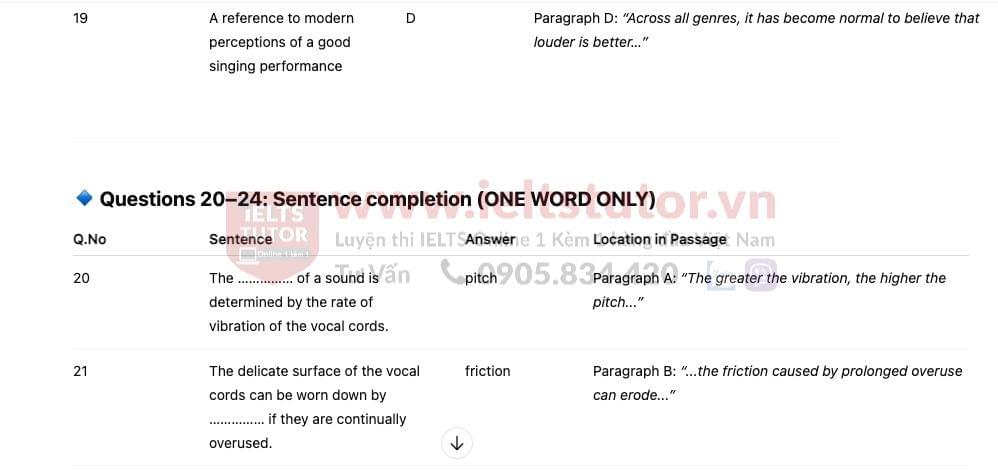
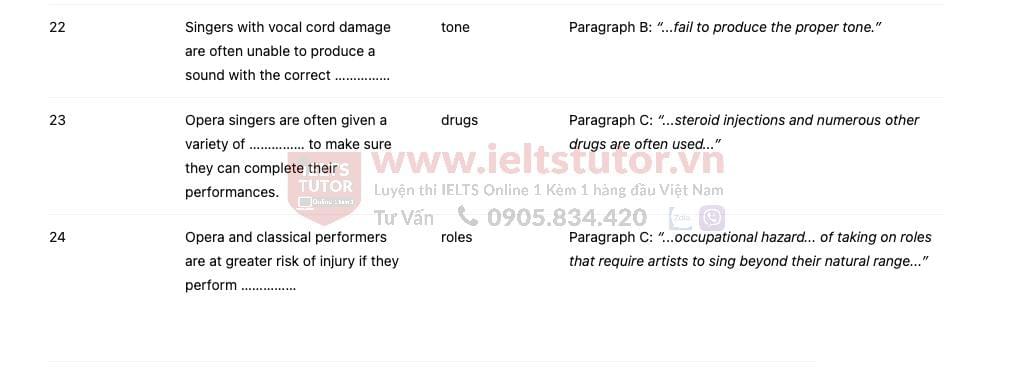

📩 MN AI CHƯA CÓ ĐÁP ÁN FORECAST QUÝ MỚI PART 1-2-3 NHẮN ZL 0905834420 IELTS TUTOR GỬI FREE HẾT NHA

Các khóa học IELTS online 1 kèm 1 - 100% cam kết đạt target 6.0 - 7.0 - 8.0 - Đảm bảo đầu ra - Thi không đạt, học lại FREE
>> Thành tích học sinh IELTS TUTOR với hàng ngàn feedback được cập nhật hàng ngày



